Please use this identifier to cite or link to this item:
https://cris.library.msu.ac.zw//handle/11408/3979| Title: | Regulatory and small-to-medium enterprise perception on equity crowd funding in Zimbabwe | Authors: | Mafunga, Itai | Keywords: | equity crowd funding regulatory perception small-to-medium enterprise perception |
Issue Date: | Nov-2017 | Publisher: | Midlands State University | Abstract: | Equity crowd funding provides a novel opportunity for small and medium enterprise to initiate business enterprise without having to rely on traditional funding mechanisms, such as banks and angel investing and in return get a stake of ownership. The use of a critical mass leveraged by internet based platforms make the raising of funds quick and less costly for entrepreneurs. In previous years, small to medium enterprises were funded through banks, angel investors and private equity/venture capital. However, in post financial crisis most players in the financial sector shifted their investment strategies from maximizing profits to minimization of risks. Government and other state enterprise are finding it difficult to intermediate because of the unfavorable fiscus position. The birth of this conspicuous form of financial innovation is tipped to transform the global business environment. However in spite of its speedy growth little is known on how it is perceived by the policy makers and small to medium enterprises in particular. In the same vein there is an absence of a regulatory framework that governs the practice of equity crowd funding in Zimbabwe. In an endeavor to better comprehend this and other phenomenon, a qualitative research was carried out. The target sample consisted of SMEs and various stakeholders that are part of the financial law making process in Zimbabwe. The research utilizes primary data coupled with secondary information. We identify theories that augments the study and further explore into the opportunities and threats associated with equity crowd funding. The study also highlighted the key elements that drive the success of the model. The research proves that equity crowd funding can be a sustainable sources of funding in Zimbabwe. However, regulations will continue to underpin the development until a comprehensive regulatory framework is in place. Technology is outpacing both entrepreneurs and the regulator at a faster rate and will continue to do so unabated. The study recommends an urgent need for a standalone local regulatory framework, availability and sharing of data, educational program and a completely new behavioral finance mindset. Lastly, we also notify the imperative need of up to date crowd funding statistical data that will provide a benchmark for subsequent quantitative equity crowd funding researches. | URI: | http://hdl.handle.net/11408/3979 |
| Appears in Collections: | Master of Commerce Degree in Banking and Finance |
Files in This Item:
| File | Description | Size | Format | |
|---|---|---|---|---|
| Itai Mafunga Dissertation Final 1.pdf | Full Text | 942.14 kB | Adobe PDF |  View/Open |
Page view(s)
164
checked on Feb 26, 2025
Download(s)
232
checked on Feb 26, 2025
Google ScholarTM
Check
Items in MSUIR are protected by copyright, with all rights reserved, unless otherwise indicated.


